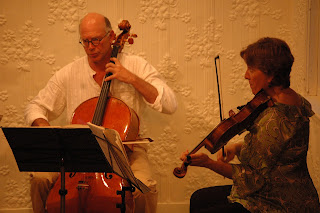 |
| Myles Jordan and Kirsten Monke, two members of the DaPonte String Quartet, in a 2012 concert of new music produced by Opera House Arts at the Burnt Cove Church in Stonington. Photo by Karen Galella. |
This weekend's news about the hostile board takeover of the Friends of the DaPonte -- ousting the founding musicians as salaried employees and changing the organization's name and mission while waving a false flag of "diversification" -- is, I can only hope, the straw on the camel's back of nonprofit board culture gone seriously awry.
The nonprofit sector, and the "culture of philanthropy" that supports it, has been -- like the "fourth estate" of the press -- an important leg of the stool that is the U.S.'s socio-cultural economy.
We all need it to be functional.
The sector's purpose -- to fill unique charitable needs -- is intended to take the capitalist rule of transactionality off the table: experiences and services are not measured solely on attendance and earnings; community relationships are more important than transactions. In the U.S., the sector, like government, exists to serve the common goods of our communities, filling gaps in public services that in other industrialized countries the government often provides more of -- including the arts.
And in the nonprofit cultural sector, some organizations are appropriately leading the way in doing the work of JEDI -- justice, equity, diversity, and inclusion -- centering the voices and work of those who have for so long been excluded, as well as adopting new ways and teams of cooperative, equitable working.
Yet over the last 40 years, in parallel with the "Reagan Revolution" move toward "supply side" economics, we've experienced an increasing amount of dominant, capitalist culture values and strategies creeping into the nonprofit sector, until today our common goods and charitable purposes are awash in a flood tide of transactional programming (services and events without relationships) and egocentric leadership (building individual resumes and prestige). Boards are too often comprised of affluent people suffering from the entitlement of "father knows best" because they've been successful in the capitalist marketplace, and they bring those unexamined, dominant culture values with them.
Nowhere is this more starkly apparent than in the recent actions of the Friends of the DaPonte board.
The DaPonte's uniquely charitable, laudable, and purposefully specific mission was to advance equity for artists. The founders knew that to truly practice and present their craft, strengthening communities through access to live music and music education, they had to create a stable income base. Remarkably, over 30 years they achieved this.
Now along comes an ambitious new Executive Director/composer and a board that misunderstands not only its governance role to steward the nonprofit's mission but how to pursue JEDI. The result: by changing the name and purpose of this nonprofit and firing the musicians as employees, they are stealing assets that don't belong to them and flying in the face of JEDI values.
Diversification of programming is laudable and necessary. So are equitable pay for artists and good governance values such as respect, listening, relationships, artist leadership, and stewardship.
It seems clear the ED and board could not get the DaPonte to go exactly where they wanted them to go -- specific programming not being the purview of the board in any event -- so instead pulled the rug out from under them.
The DaPonte are artists who created a nonprofit with a small, singular purpose to sustain their craft and their community impact. If, after discussions with them, the ED and individual board members remained dissatisfied, they had several options open to them -- notably recognizing they are in the wrong place and departing to start their own nonprofit chamber music series.
Instead, they've chosen the path of theft and disrespect, laying bare the damaging mechanics of inequitable governance run amok.
Let's hope this incident can, first, be over turned and secondly that it sparks the necessary conversations, awareness, and changes the nonprofit governance model desperately needs.
#nonprofitmaine
#governance
#culture












